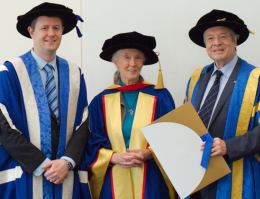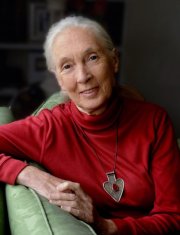06 June 2014
 Recognising her enormous contribution to science, to primatology and more broadly animals and conservation globally, the University of South Australia will award Dame Jane Goodall an Honorary Doctor when she visits Adelaide this week.
Recognising her enormous contribution to science, to primatology and more broadly animals and conservation globally, the University of South Australia will award Dame Jane Goodall an Honorary Doctor when she visits Adelaide this week.
The award will be presented by UniSA Vice Chancellor Professor David Lloyd at a special public lecture hosted by Zoos SA and presented by Dr Goodall as part of her 80th birthday speaking tour, at the Adelaide Zoo on Saturday June 7 between 10am and 12.30pm.
Prof Lloyd says Dr Jane Goodall is one of the most inspirational figures of our times.
“From her earliest years she has been drawn to animals and a quest to understand more about the way they live and the connections between people and animals – what makes us the same and sets us apart,” Prof Lloyd says.
“But like many of the students who attend UniSA, the path to higher education was not an easy one for Jane and in 1952 when she graduated from high school there was no way she could afford to go university.
“But a dream of going to Africa was more possible and equipped with secretarial skills she worked at Oxford as a typist and then finally quit, moved home and became a waitress to earn the return fare more quickly.
“In Africa she met Dr Louis S B Leakey, a meeting that changed her world and ours. As part of Leakey’s expedition at 23 years old she began her study of wild chimpanzees on the shores of the Gombe stream in Tanzania.
“With enormous patience and sensitivity, Jane was eventually accepted by the chimpanzees and soon discovered ground-breaking facts about their behaviour – that they were not vegetarian but in fact omnivores and that they had learnt to use tools to support food gathering.
“She also came to understand their society, the good and the somewhat darker aspects of it, with echoes of our own human society.”
 In 1962 on the strength of her work, she was accepted at the University of Cambridge as a PhD candidate - one of only a handful of people to be given that opportunity without having studied an undergraduate degree.
In 1962 on the strength of her work, she was accepted at the University of Cambridge as a PhD candidate - one of only a handful of people to be given that opportunity without having studied an undergraduate degree.
Prof Lloyd says Dr Goodall’s passion for her research, her dedication and curiosity provided the foundation of future primate research, helped to redefine the relationship between humans and animals and has supported worldwide action to support animal conservation.
In 1977 Dr Goodall established the Jane Goodall Institute, which is a global leader in the effort to protect chimpanzees and their habitats. The Institute is widely recognised for innovative, community-centred conservation and development programs in Africa.
She founded Roots & Shoots with a group of Tanzanian students in 1991 which today connects hundreds of thousands of young people from more than 130 countries to take action to make the world a better place for people, animals and the environment.
In her 80th year Dr Goodall still travels an average 300 days per year, speaking about the threats facing chimpanzees, other environmental crises, and her hope that humankind will solve the problems it has imposed on the earth.
She has been acknowledged globally for her work receiving the French Legion of Honor, the Medal of Tanzania, the UNESCO Gold Medal Award, the Gandhi/King Award for Nonviolence, the Benjamin Franklin Medal in Life Science, and Japan’s prestigious Kyoto Prize. In 2002 she was appointed to serve as a United Nations Messenger of Peace and the following year was invested as a Dame of the British Empire.
“It is a great privilege to add our award to the global recognition Dr Goodall has received and in conferring this honorary doctorate acknowledge a person who has changed the way we think, who has in her own way challenged traditional academic knowledge and practice, and continues to encourages us to change the way we act in the world,” Prof Lloyd says.
Media contact: Michèle Nardelli office: 08 8302 0966 mobile: 0418 823 673 email: Michele.nardelli@unisa.edu.au




